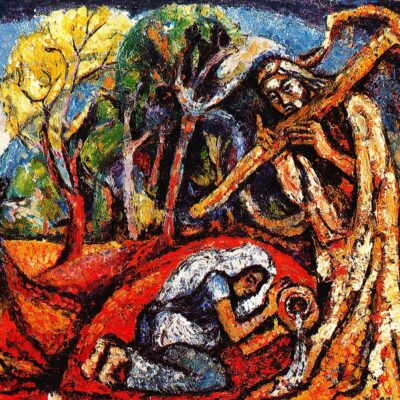The Passion narrative is such a difficult story to hear. So heartbreaking.
One thing I have always loved about our Episcopal Church is that worship is not a passive experience. We are always invited to participate: to sing and speak, to stand, sit, and, sometimes, kneel.
Holy Week takes this participatory worship to a whole new level.
This past Sunday, Palm Sunday, after we heard the story of Jesus’ triumphant entry into Jerusalem, and we raised our own palm branches and chanted Hosannas, as we processed into church.
Last night, we listened as Jesus shared with his disciples the Great Commandment, that we love one another as he loved us, and then we, too, followed in his footsteps and washed each other’s feet.
And then, there’s today.
Today is the second of the Great Three Days of Easter. Good Friday. And today is the darkest, most difficult, most painful day of the Christian year.
Today, our focus goes to the death of Jesus.
As we have just heard, Judas betrays Jesus. Peter denies him. His other followers desert him. He is now in the grip of a remorseless empire, that see him as only a threat to be dealt with and silenced. He undergoes a farce of a trial. He is flogged and mocked. And he is forced to carry his own cross to a shameful, public execution, like a common criminal.
It is almost too painful to bear.
And it’s so tempting to just skip ahead in the story. After all, we know how it ends, right? Everything turns out just fine! Can’t we just jump over the Good Friday story, and move straight into Easter?
It’s tempting.
But if we do that, we risk losing the gifts that this day gives. Even if they are gifts we would rather not have.
First, Good Friday reminds us of a very difficult, but very central truth. As our Buddhist friends say, “Suffering is universal.”
People are undergoing constant, relentless suffering right now.
The family members and loved ones of those who lost their lives in the Covenant Christian School, Michigan State University, or any one of the other 375 school shootings that have happened in this country since 1998.
Or the mothers and fathers, other family members, and loved ones of George Floyd, Tyre Nichols, Sandra Bland, and far too many others, who were killed for no other reason than being where they were, when they were, and who they were.
Or those grieving the loss of family members in war in Ukraine, Sudan, and South Sudan, earthquakes in Turkey and Syria, or the less publicized, but equally devastating suffering right here, in our community. You may have your own stories to share, your own, or others.’
Good Friday offers us an opportunity to remember and hold that suffering. Not to ignore it, not to gloss over it, or push past it, as our culture urges us to do. But to gather, to acknowledge our shared pain, to lament and mourn, and hold one another in our grief.
Which leads us to another gift of Good Friday.
As Mother Hillary shared in her sermon last evening, in enduring his Passion, Jesus modeled self-sacrificing love for us all. He knew his friends would desert, deny, and even betray him, but he included and loved them anyway. In Luke’s telling of the Passion Story, Jesus forgives the Roman soldiers while they were crucifying him, praying, “Father, forgive them, for the do not know what they are doing.” Jesus modeled these powerful acts of forgiveness for us. And he also let us see his own struggles.
Just before his arrest and trial, in the Garden of Gethsemane, Jesus shares with his disciples that he is “deeply grieved, even to death.” He takes Peter, James, and John with him, and asks them to watch and wait with them as he goes apart to pray.
Of course, they don’t. They fall asleep, as only they can.
But as Jesus prays, he ends his prayer with, “Father, if you are willing, remove this cup from me. Yet, not what I want, but what you want.”
And in the reading of the Passion we heard on Sunday, just before he died on the Cross, Jesus cries out, “My God, my God, why have you forsaken me?”
If you are or have been in a place of suffering, if you have longed for it to just go away, or felt forsaken by God, please know one thing.
Jesus also longed for the cup to pass from him. Jesus also felt forsaken by God.
You are not alone.
Which brings us to the third gift that Good Friday offers.
All four Gospel agree that Jesus suffered and died upon the cross. But he didn’t die alone. Some of his followers – mainly women – gathered and watched with him at the foot of the Cross. His own mother was there. They couldn’t do anything to stop it. They couldn’t ease his suffering. It must have been agonizing beyond belief.
And yet, they came.
They put their own lives at risk. Any one or all of them could have been labeled as collaborators, arrested, and flogged, and executed, too. The Roman Empire wasn’t above crucifying women.
But their love for Jesus – the love he kindled in them – was so strong, so powerful, they chose to do the one thing they could do.
They showed up. They let Jesus know he was loved, and remembered, and they didn’t let him die alone.
And then, Nicodemus – remember him? The one who was so concerned about the authorities, he would only come to see Jesus at night?
He and Joseph of Arimathea, another rich and powerful member of the Council, claimed Jesus’s body, and provided a tomb and spices to anoint him for honorable burial. They put their own status and position at risk.
They showed up.
We, too, are invited to show up. Whatever that looks like for each one of us. Even if we can’t fix a situation or make everything better. Even if the only gift we have to offer is our presence, we can still offer it.
Now, many of us are already doing this already, whether driving friends to medical appointments, meeting weekly over Zoom to pray for the needs in our community, or providing welcoming hospitality in Edible Hope.
Some of us make our living this way. As teachers, mental health case workers, or nurses, as Mother Hillary mentioned in her sermon last night. And so many more.
At the end of our service today, we will have the opportunity to participate once again. This time, we are invited to keep our own vigil at the foot of the Cross, as those followers of Jesus did so many years ago. To remember our failings, both as individuals and communally. To reflect on the life, death, and suffering of Jesus and on what his love has done for us. To remember all of our suffering, to feel our own grief and the grief of others, and to place it at the foot of the Cross.
And then, if we feel so moved, either today, or in the days, or weeks or months ahead, we are invited to consider: where might we have the opportunity – or be given the grace – to show up?
Amen.







Leave a Reply